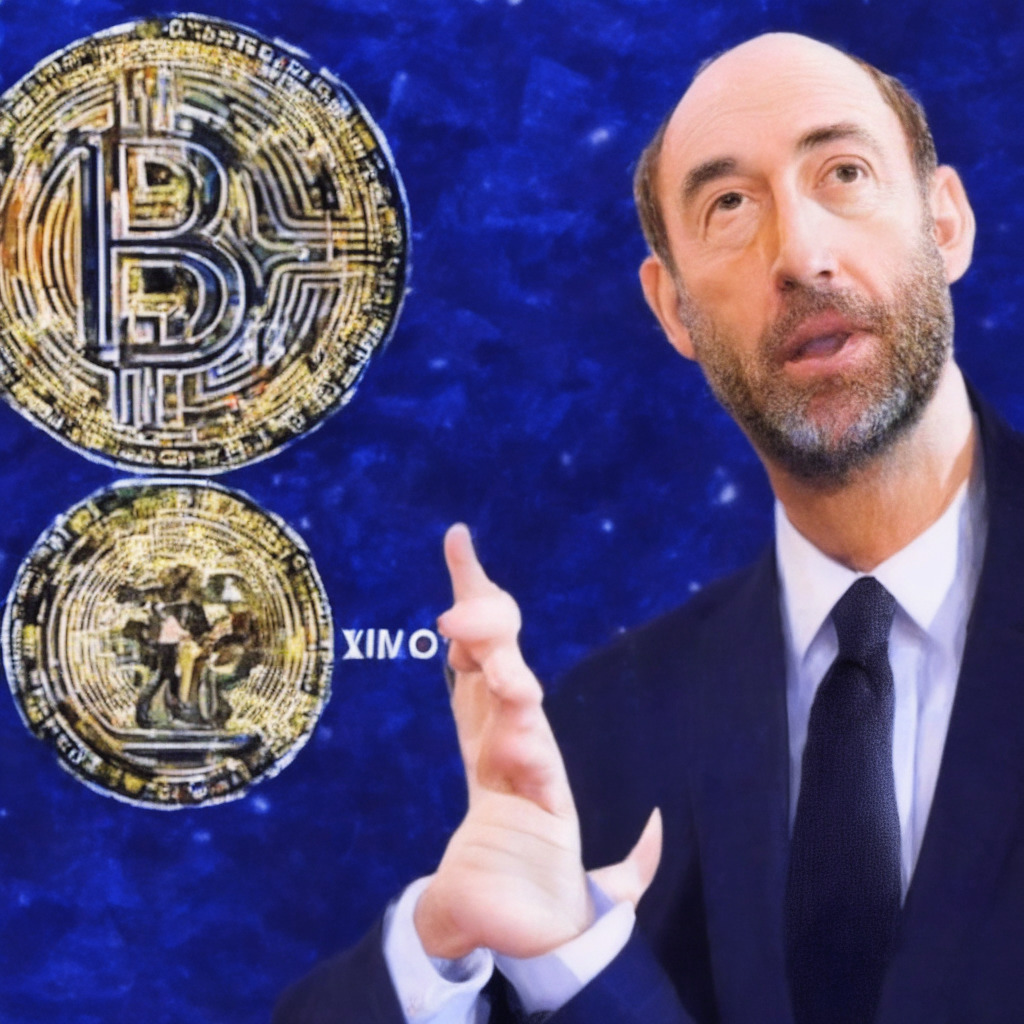“The discord between Ripple Labs and the SEC reflects global uncertainty on the legal status of cryptocurrencies. CEO Brad Garlinghouse criticizes the SEC’s regulatory approach, leading to investor losses and seemingly unnecessary trials, advocating for efficient legislation over ‘more regulation by enforcement.'”
Search Results for: Ripple CEO
Hinman Emails Stir Controversy: Ripple CEO Weighs In and Future Implications for Crypto
The Hinman Emails’ release has sparked debate on the SEC’s actions regarding Ripple and the crypto industry, with Ripple CEO Brad Garlinghouse calling for transparency, fairness, and integrity in regulation. The ongoing Ripple-SEC case could impact the future of cryptocurrencies, highlighting the need for clear guidelines and government accountability.
Unveiling SEC’s True Motives: Ripple CEO Questions Lawsuits Against Binance and Coinbase
Ripple CEO Brad Garlinghouse expresses doubts over the SEC’s motives in suing Coinbase and Binance, suggesting their attacks on crypto businesses stem from the agency’s shortcomings in the FTX case. The crypto community unites against the SEC, anticipating the release of Hinman documents soon.
Ripple CEO’s Confidence in Verdict: The Future of Crypto Regulations Rests on SEC Battle
In a recent interview, Ripple CEO Brad Garlinghouse expressed optimism for a verdict in the SEC lawsuit within weeks, following developments in the legal battle over the Hinman Docs – a case with significant implications for cryptocurrency regulations.
Ripple CEO’s $200M Lawsuit Struggle: A Lesson on US Crypto Regulation’s Uncertainty
Ripple CEO Brad Garlinghouse revealed that defending against the SEC lawsuit may cost around $200 million, while expressing concerns over the lack of clear cryptocurrency regulation in the U.S. He praised the progress made by the UAE and the EU, suggesting other countries follow their lead in establishing a comprehensive regulatory framework promoting innovation and protecting investors.
Unraveling Ripple’s Future: Implications of CFO’s Sudden Exit on Crypto Landscape
Kristina Campbell, Ripple’s CFO left the company igniting speculations about Ripple’s future amidst an ongoing SEC lawsuit. Campbell, who significantly impacted Ripple’s financial journey, now serves as the CFO of Maven Clinic. Ripple’s silence over her departure raises questions and could affect investor confidence.
Navigating Uncertain Waters: Regulatory Influence in Crypto’s Course and Ripple’s Ongoing Legal Drama
“Highlighted is the critical role of regulation in the crypto industry’s evolution, and its capacity to shape future developments. Ripple’s ongoing legal struggle with the U.S. Securities and Exchange Commission exemplifies high-profile regulatory challenges. The delicate balance between fostering innovation and deterring fraudulent practices underpins the crypto sphere’s future.”
Layoffs in Crypto Space Amid Market Slump: Temporary Ripple or a Diagnosing Tremor?
“Crypto hardware wallet manufacturer, Ledger, announced a 12% workforce retrenchment due to macroeconomic challenges affecting revenue. Despite a thriving crypto market, a global inflation spike, interest rate increases, and catastrophic events like the Terra ecosystem collapse have caused a significant downturn in the crypto industry, resulting in numerous layoffs.”
Ripple vs SEC: The Unresolved Story in the Crypto Legal World
In the ongoing legal battle between Ripple and the SEC, Judge Torres recently rejected the SEC’s planned appeal. While some view this as a significant win for Ripple, other experts warn against premature celebration. Refusal of the appeal doesn’t signal outright defeat for the SEC, but only means they have to appeal everything at once post-trial. However, a challenging factual record could make a successful appeal more difficult.
Ripple’s Rise in Singapore vs. Coinbase’s Legal Quagmire: Paving the Path for Crypto Regulation
The Monetary Authority of Singapore has awarded Ripple a digital payment tokens license, enhancing its position in the digital asset market. Concurrently, the SEC and Coinbase are engaged in a contentious lawsuit, calling attention to potential hurdles and the urgent need for clear cryptocurrency regulation.
Ripple’s Abrupt Pullout from Fortress Trust Acquisition: Strategic U-Turn or Cautionary Tale?
“Ripple has withdrawn its offer to acquire Fortress Trust, citing a shift in its U.S growth strategy. This follows a substantial monetary loss at Fortress due to a security breach, leading Ripple to reassess and eventually retract its procurement offer, affecting other organizations associated with Fortress Trust.”
CEO Deny Puts Spot on Blockchain Future: Crypto-Lending Brings Risk and Reward
Former FTX CEO, Sam Bankman-Fried, has been denied temporary release ahead of his trial, with concerns about him being a flight risk. Meanwhile, BTC lending platform, Ledn, introduces an Ethereum yield product, highlighting the interplay between regulation and innovation in blockchain.
Ripple’s Expansion in the UK: Crypto Boom or Regulatory Burden?
Ripple, a US fintech and blockchain firm, is expanding its British presence amidst regulatory challenges in the US. This follows the UK’s strategic efforts to become a global hub for crypto and fintech firms, including legislation regulating cryptocurrencies and stablecoins. Critics, however, fear this may limit open innovation.
Growing Uncertainty and Trust Issues in Crypto as Binance.US CEO Steps Down: A Deep Dive
Brian Shroder’s departure as CEO of Binance.US has led to widespread uncertainty, impacting crypto trust quotient. As crypto platforms grapple with trust and credibility issues, they face a challenging task: establishing security to ease investor worries. Only through earning investors’ trust can they shape a stable future.
Understanding the Federal Judge’s Ruling and Blockchain Regulation in the FTX CEO’s Case
The federal judge ruled in favor of the DoJ against seven witnesses testifying for ex-FTX CEO, Sam Bankman-Fried (SBF), facing charges related to alleged misuse of user funds. This ruling raises questions on the regulation of blockchain technologies, showcasing a tug-of-war between innovators and regulatory bodies.
Decoding the $15M Crypto Heist: A Story of Invasion, Acquisitions, and Ripple’s Intervention
Fortress Trust’s $15 million cryptocurrency heist involved third-party vendor, ReTool, which built the portal managing Fortress’s cryptocurrency reserves. The breach, traced to a sophisticated phishing strike, impacted 27 clients. Ripple, a blockchain tech corporation, initiated a $15 million payment to help Fortress compensate affected clients, amid acquisition talks.
Ripple’s Acquisition of Fortress Trust: A Response to Security Breach or Strategic Move?
“Ripple’s acquisition of the Fortress Trust was influenced by a security breach involving a third-party analytics vendor. The breach resulted in a loss of approximately $12-$15 million, primarily in Bitcoin. This incident underscores the critical importance of security and transparency in crypto-asset management and showcases businesses’ willingness to act decisively to protect customers.”
Ripple Migration: A Wake-Up Call on Regulatory Clarity in the Crypto Industry
Ripple CEO Brad Garlinghouse revealed that 80% of the company’s recruitments in 2021 will be in nations with clear regulatory landscapes like Singapore, Hong Kong, U.K., and Dubai, due to the ongoing legal frost with the U.S. SEC. This underscores how uncertain regulations can impact global industry growth.
Ripple’s Strategic Acquisition of Fortress Trust: Innovation or Defensive Measure?
“Ripple’s strategic acquisition of Fortress Trust bolsters its position in the blockchain markets, adding to its portfolio of over 30 US regulatory licenses. The acquisition could serve dual purposes, expanding services and customer value while also fortifying against unpredictable US regulation.”
Ripple’s Strategic Move: Seizing Ownership of Fortress Trust- Boon or Bane?
“Ripple, a blockchain enterprise, recently acquired Fortress Trust, a trust company specializing in cryptocurrency and Web3 applications. The move expands Ripple’s regulatory licenses in the U.S., aligning it with its goal to become a leading service provider in the evolving blockchain world.”
FTX Leadership Legal Woes: A Ripple Effect on Cryptocurrency Sector’s Future?
“Ryan Salame, a leading figure at FTX, is reportedly facing legal issues, potentially impacting the future of FTX and its operations. His situation could affect investor sentiment in the already volatile crypto market. Despite concern, the crypto space by nature is unpredictable, and situations like this are often the cost of operating in a new sector.”
Expanding Horizons: SBI Remit and Ripple’s Blockchain Impact on Southeast Asian Remittances
“SBI Remit partners with SBI Ripple Asia to implement Ripple’s XRP-enabled international remittance solution, extending services to bank accounts in Vietnam, Indonesia, and the Philippines. Utilising XRP as a “bridge currency”, this move aims to streamline international payments, ensuring efficient and cost-effective money transfers.”
Financial Misconduct Scandal at Crypto Exchange FTX: Ripple Effect on the Crypto Industry
“Recent filings at the United States Bankruptcy Court indicate financial irregularities at crypto exchange FTX. Documents suggest misuse of company funds by executives, with transactions aimed to enrich the top brass at FTX and Alameda Research.”
Navigating the Ripple Effect: SEC’s Token Tug-of-War and Its Broader Implications
Ripple Labs objects to the SEC’s appeal of a judge’s ruling on the XRP token’s nature. The SEC wants to reclassify XRP as a security when sold to the public. Their appeal is paused until a resolution, highlighting the potential implications for future cryptocurrency lawsuits. Arguments involve whether selling XRP equates to an investment contract and jurisdiction over sales to institutional investors. Ripple’s response promises to challenge classifications of these sales as securities transactions.
Ripple vs SEC Showdown: Debating XRP Token’s Status and Impact on Crypto Landscape
In Ripple’s ongoing legal tussle, their legal representatives dismissed an appeal by the US SEC on the status of its XRP token. This dismissal is based on a July court ruling stating the XRP token did not majorly qualify as a security for retail sales. The expected jury trial date for this lawsuit is set for 2024, suggesting potential long-term implications for Ripple and the broader crypto industry.
High-Profile Departure from Binance: Tracing the Ripple Effect in the Blockchain Cosmos
Leon Foong, former head of Binance Asia-Pacific, is reportedly leaving the leading cryptocurrency exchange amidst its burgeoning expansion and regulatory challenges. Despite such high-profile departures, Binance CEO Changpeng Zhao actively advances towards his 200M-user goal in Asia-Pacific, undeterred by the regulatory struggles. Binance’s future, thus, remains an exciting puzzle wrapped in uncertainty.
Ex-FTX CEO’s Legal Orchestra: Defense Preparation vs Detainment Standards
Ex-CEO of FTX, Sam Bankman-Fried, is caught in a legal battle with his defense attorneys’ appeals for temporary release being rejected by the court. This debate exposes a complex tug-of-war between comprehensive defense rights and the consideration of detainment standards and charges weights.
Bitcoin Velocity Dips: Stagnation or Whales Playing it Cool? Ripple SEs Legal Distractions
Bitcoin’s velocity, reflecting how swiftly BTC moves around the network, has hit a slowing point, indicating a stagnant Bitcoin supply at around $26,000. This could suggest that large Bitcoin holders maintain their holdings rather than selling, sparking a debate in the market. The slowdown also has implications for other cryptocurrencies, particularly Ripple Labs, currently under the scrutiny of the Security and Exchange Commission.
Visa and Mastercard Sever Ties with Binance: A Shake-up or Just a Ripple in the Crypto Market?
“Payment giants Visa and Mastercard have distanced themselves from Binance amid ongoing regulatory challenges for the leading crypto exchange. Despite this, industry experts predict modest impact on Binance’s market share. The situation illustrates how institutional caution could affect the cryptocurrency market’s future.”
Legal Shifts in Ripple v. SEC: A Game of Musical Chairs and Patricia’s PTK Launch: Building Suspense or Building Concern in Crypto World?
“The ongoing SEC v. Ripple lawsuit takes a fascinating turn with the withdrawal of three SEC attorneys and the addition of new ones, potentially impacting case progression. Meanwhile, Nigerian crypto exchange Patricia launches its native token, Patricia token (PTK), amidst security breach speculations and customer fund access issues, sparking worries of a potential exit scam. These developments underscore existing uncertainties in crypto regulation.”
BNB Value Dips Amid Binance Controversies: Ripple Effects & Possible Solutions
“The BNB crypto token has experienced a decrease in value due to Binance’s questionable activities and increasing legal scrutiny, affecting its $32 billion market position. Binance’s involvement with offshore funds movement amid international sanctions has heavily impacted BNB’s value and broader digital currency markets.”
Ran Neuner vs Ripple: Unraveling the Crypto Skepticism and Prospects for Future Market Evolution
Ran Neuner, Crypto Banter’s CEO, calls out Ripple for its centralized structure and the ethics surrounding the company’s conduct regarding its XRP token. His criticism extends to the practice of the centralized company selling tokens to support its own operations, a process he believes favors the company’s shareholders more than the token holders. Despite his harsh viewpoints, Neuner is also recognized for promoting an integrated approach to crypto, appreciating both centralization and decentralization, and advocating ethical, fair practices.































